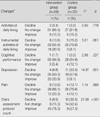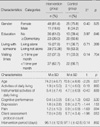Abstract
Purpose
To evaluate the effects of case management using Resident Assessment Instrument-Home Care (RAI-HC) in home health service for older people.
Methods
All elders were assessed at baseline and 3 months later using RAI-HC. The change of function in the intervention group was compared with that of a conventional intervention group. Function was measured with Activities of Daily Living (ADL), Instrumental Activities of Daily Living (IADL), Cognitive Performance Scale (CPS), Depression Rating Scale (DRS), Pain and the number of Clinical Assessment Protocols (CAP).
Results
Among ninety two elders participated in the program, 59 were allocated to the case management group and 33 to the conventional group. The intervention, home health service by a nurse over a 3 month period, consisted of comprehensive assessment, case conference for care plan, direct care, education and referral, and outcome evaluation. The percent of elders whose function improved in the intervention group was greater than the conventional group for depression (odds ratio [OR]: 10.941, confidence interval [CI]: 2.338-51.206), IADL (OR: 4.423, CI: 1.151-16.999) and the number of CAP (OR: 11.443, CI: 3.805-34.410).
Conclusion
Case management was effective for older people in the community. The effect might have resulted from individual, systematic intervention, however, standards of service including eligibility criteria for case management and collaboration of multi-disciplines is required for more effective home health service programs.
Figures and Tables
Table 2
Comparison of Outcomes between Intervention and Control group

*"Decline" means that score of ADL, IADL, cognitive performance scale, depression rating scale, pain scale and the number of CAPs increased from baseline to follow-up; "Improve" means that score of ADL, IADL, cognitive performance scale, depression rating scale, pain scale and the number of CAPs decreased.
References
1. Bernabei R, Landi F, Gambassi G, Sgadari A, Zuccala G, Mor V, et al. Randomised trial of impact of model of integrated care and case management for older people living in the community. British Medical Journal. 1998. 316:1348–1351.
2. Burrows AB, Morris JN, Simon SE, Hidres JP, Phillips C. Development of a minimum data set-Based depression rating scale for use in nursing homes. Age and Ageing. 2000. 29:165–172.
3. Carpenter GI, Demopoulos GR. Screening the elderly in the community: Controlled trial of dependency surveillance using a questionnaire administered by volunteers. British Medical Journal. 1990. 300:1253–1256.
4. Fries BE, Simon SE, Morris JN, Flodstrom C, Bookstein F.L. Pain in US nursing homes: Validating a pain scale for Minimum Data Set. Gerontology. 2001. 41:173–179.
5. Hallberg IR, Kristensson J. Preventive home care of frail older people: A review of recent case management studies. Journal of Clinical Nursing. 2004. 13(6b):112–120.
6. Hamilton M. Development of a rating scale for primary depressive illness. The British Journal of Social and Clinical Psychology. 1967. 6:278–296.
7. Hartmaier SL, Sloane PD, Guess HA, Koch GG, Mitchell CM, Phillips CD. Validation of the minimum data set cognitive performance scale: Agreement with the Mini-Mental State Examination. Journal of Gerontology. Series A, Biological Science and Medical Sciences. 1995. 50:M128–M133.
8. Health insurance review statistics. Health Insurance Review and Assessment Service & National Health Insurance Corporation. 2007. Retrived June 12, 2008. from
http://www.hira.or.kr/common/dummy.jsp?pgmid=HIRAF010303000000.
9. Hendriksen C, Lund E, Stromgard E. Consequences of assessment and intervention among elderly people: A three-year randomized controlled trial. British Medical Journal. 1984. 289:1522–1524.
10. June KJ, Cho YM. A survey on functional status among low income older adults living at home. Journal of Korean Academy of Nursing. 2001. 31:749–758.
11. Katz S, Ford AB, Moskowitz RW, Jackson BA, Jaffe MA. Studies of illness in the aged. The index of ADL: A standardized measure of biological and psychological function. The Journal of the American Medical Association. 1963. 185:914–919.
12. Kim EK, Park HY, Kim C.Y. On the feasibility of a RUG-III based payment system for long term care facilities in Korea. Journal of Korean Academy of Nursing. 2004. 34:278–289.
13. Kim HG. Development of case management model for the bedridden elderly at home and its evaluation: Focusing on RAI MDSHC 2.0 Application. 2001. Seoul: Chung Ang University;Unpublished doctoral dissertation.
14. Census of population in Korea on 2005 years. Korea National Statistical Office (KNSO). 2006. Retrieved June 12, 2008. from http://www.kosis.kr.
15. Lawton MP, Brady EM. Assessment of older people: Self maintaining and instrumental activities of daily living. The Gerontologist. 1969. 9:179–186.
16. Lee SH, Kim HJ, Chang HS. Development of services delivery model for the elderly in the community. 2000. Seoul: Korea Health Industry Development Institute.
17. Ministry for Health and Welfare. Guideline of visiting health program for 2006. 2006. Seoul: Author.
18. Morris JN, Fries BE, Bernabei R, Steel K, Ikegami N, Carpenter I, et al.
CY Kim
SM Kim
. RAI-HC Assessment manual Seoul. 2000. Washington DC: interRAI Corporation;(Original work published 1999).
19. Morris JN, Fries BE, Mehr DR, Phillips C, Mor V, et al. MDS Cognitive Performance Scale. Journal of Gerontology. 1994. 49:M174–M182.
20. Morris JN, Fries BE, Morris SA. Scaling ADLs with theMDS. The Journal of Gerontology, Series A, Biological Sciences and Medical Scienc. s. 1999. 54:M546–M553.
21. Nicolaides-Bouman A, van Rossum E, Habers H, Kempen GI. Home visiting programme for older people with health problems: Process evaluation. Journal of Advanced Nursing. 2007. 58:425–435.
22. Phillips CD, Morris JN, Hawes C, Fries BE, Mor V, Nennstiel M, et al. Association of the Resident Assessment Instrument (RAI) with changes in function, cognition, and psychosocial status. Journal of American Geriatrics Society. 1997. 45:986–993.
23. Stuck AE, Aronow HU, Steiner A. A trial of annual comprehensive geriatric assessments for elderly people living in the community. New England Journal of Medicine. 1995. 333:1184–1189.
24. Theander E, Edberg AK. Preventive home visits to older people in Southern Sweden. Scandinavian Journal of Public Health. 2005. 33:392–400.
25. Thome B, Dykes A, Hallberg IR. Home care with regard to definition, care recipients, content and outcome: Systematic literature review. Journal of Clinical Nursing. 2003. 12:860–872.
26. van Rossum E, Fredericks C, Phillips H, Portengen K, Wiskerke J, Knipschild P. Effects of preventive home visits to elderly people. British Medical Journal. 1993. 307:27–32.
27. Yi GM, Kim HJ. Depression and anxiety in community-dwelling older persons of Korea. Journal of the Korean Gerontological Society. 2000. 20:109–121.
28. Yoon JY. The effect of case management for the frail elderly at home. 2006. Seoul: Seoul National University;Unpublished master's thesis.
29. Zander K. Nursing case management in the 21st Century: Intervening where margin meets mission. Nursing Administration Quarterly. 2002. 26(5):58–67.




 PDF
PDF ePub
ePub Citation
Citation Print
Print




 XML Download
XML Download